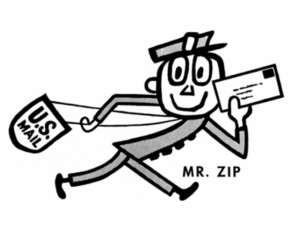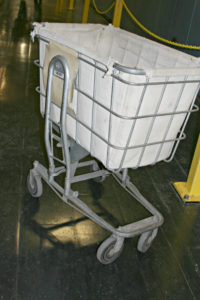Your Guide to Postal Abbreviations
My days of studying French are over, but I’ve found new work in translating the wild world of words at the Postal Service® starting with monkey-free swing rooms, buggies without babies and bird-less cages. Sound bizarre? Postal lingo is a creative expression of words and phrases used to get the mail processed and delivered.
To those who have never been exposed to the operations of a Post Office™ or mail processing plant, these terms may sound strange, but read on to learn the lingo from a postal insider.
With the current shortcuts used via the internet and social media, the Postal Service has been shortening terms to acronyms to ease communication and provide consistency in terminology across the organization.
United States Postal Service® (USPS®)
The acronym used for our organization itself, USPS, may not bring instant recognition for what it represents — United States Postal Service®. While some still use the “Post Office Department”, which was the official name until 1971 when it was reorganized, many just refer to the organization as “the Post Office.”
Postmaster General™ (PMG)
The Chief Executive Officer of the Postal Service is the PMG or Postmaster General, an office that dates back to Benjamin Franklin who was the first PMG appointed by the Continental Congress in 1775. The current PMG is Megan Brennan who took office in 2015.
Computer Forwarding System (CFS)
I started at the Postal Service as a clerk in the Computer Forwarding System unit – otherwise known to postal employees as CFS – processing C-O-As.
Change of address (COA)
A COA – change of address –provides opportunity for a former resident or place of business to change mailing information so mail can be forwarded to the new location. Throughout life, you’ll probably have multiple chances to complete the form. This can be done digitally at the Official USPS Change of Address site where over 14 million address changes were submitted online in 2015.
Zone Improvement Plan (ZIP Code™)
ZIP Code™ has become very familiar and well-known to customers. The ZIP Code helps direct packages, letters, and other mail pieces to their destinations. Because it has become such a part of addressing, many do not know it is an acronym for Zone Improvement Plan. This program was added nationwide in 1963 to help process the growing number of addresses. ZIP Codes are often simply referred to as “zones” by postal employees when conversing about which office they work in or where a mailpiece belongs. In 1984, the ZIP+4® was added to provide further efficiency with automated sortation equipment. Looking up a ZIP Code is easy with the Zip tool.
Common terms for mail processing equipment
Speaking of automated equipment, the vast array of machines used to process mail owes a lot to acronyms:
Advanced Facer Canceler System (AFCS)
Automated Package Processing System (APPS)
Barcode Reader (BCR)
Delivery Barcode Sorter(DBCS)
Optical Character Reader (OCR)
Some employees only know the equipment by acronym and not what each letter stands for. These processing machines can be found on “the workroom floor” at mail processing plants where clerks, mailhandlers, expeditors and maintenance employees work across the country to process an average of 509 million mail pieces each day.
USPS Employee Titles
Letter Carrier
There are some titles that take a long time to retire from use as new ones come into use. As I grew up, a “mailman” delivered my letters and packages but today the “letter carrier” comes by. This shift in terminology takes into account the over 40 percent of females in the workforce.
Retail Associate
At the retail counter or “window,” the employee selling stamps and accepting packages and mail used to be called a “window clerk” but now goes by “retail associate.”
More Post Office Lingo
Hot Case
Whether the workroom floor is boiling or freezing, you can’t burn yourself if you touch the “hot case.” I’ve sat in front of many during my early career and attest that the metal sorting case stays at room temperature no matter how fast you’re sorting mail into it. This final station holds mail for “hot” last-minute sorting or re-sorting of mail. Carriers collect this mail before leaving on their routes, ultimately packing up all available pieces for the day. Our goal: keep our customers happy!
The Cage
What about “the cage?” Larger than the average cage for household pets, this is not used to house animals but is a metal rolling platform used to transport mail and packages from processing equipment to delivery units. The cage nickname probably comes from it having half-inch bars all the way around (see photo). Technically known as an all-purpose container (APC), the rolling piece of mail transport equipment (MTE), often has a shelf which gets filled with mail tubs and trays.
Swing Room
The “swing room” obviously sports no gorillas. Bananas, yes! The place is for lunch or breaks for temporarily off-duty employees to spend their time. Sometimes recognition events for employees happen there too.
U-Cart
A “U-cart” (or sometimes called a U-boat) is a utility cart used for moving small amounts of mail from Point A to Point B and is affectionately called a “buggy.” As employees call for a buggy instead of a utility cart more often in postal facilities across the country, the jargon makes it quicker and easier to get work done. All the while approximately 5,890 mail pieces are processed each second during an average day.
Flat
Now for my favorite unique term that’s basic yet fun: “flat” — flat shoe, flat pancake, flat tire, flat what? “Flat-size” refers to items like magazines or large envelopes which are sorted without bending so that the mail remains flat. “Flats” are placed into tubs (white plastic rectangular containers) used for transport of the mail – not for carrying water.
Every company or industry has their own jargon, acronyms and unique terms. Some are funny and some are utilitarian, but they develop to improve the efficiency of communication between workers. With these few examples of postal terminology, you can surprise your letter carrier, retail associate or postal friend by interjecting a bit postal lingo into your next conversation.

